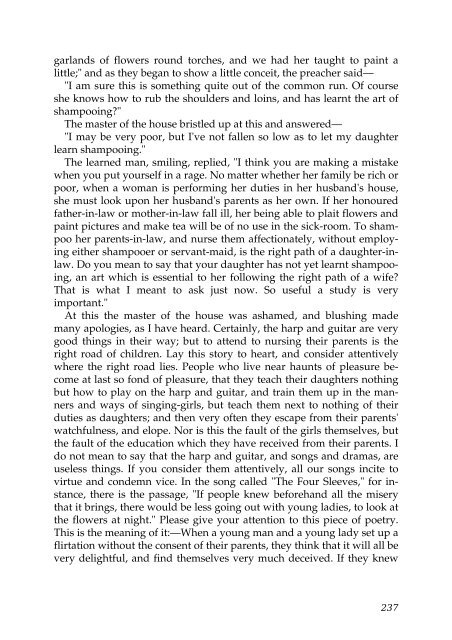You also want an ePaper? Increase the reach of your titles
YUMPU automatically turns print PDFs into web optimized ePapers that Google loves.
garlands <strong>of</strong> flowers round torches, and we had her taught to paint a<br />
little;" and as they began to show a little conceit, the preacher said—<br />
"I am sure this is something quite out <strong>of</strong> the common run. Of course<br />
she knows how to rub the shoulders and loins, and has learnt the art <strong>of</strong><br />
shampooing?"<br />
The master <strong>of</strong> the house bristled up at this and answered—<br />
"I may be very poor, but I've not fallen so low as to let my daughter<br />
learn shampooing."<br />
The learned man, smiling, replied, "I think you are making a mistake<br />
when you put yourself in a rage. No matter whether her family be rich or<br />
poor, when a woman is performing her duties in her husband's house,<br />
she must look upon her husband's parents as her own. If her honoured<br />
father-in-law or mother-in-law fall ill, her being able to plait flowers and<br />
paint pictures and make tea will be <strong>of</strong> no use in the sick-room. To shampoo<br />
her parents-in-law, and nurse them affectionately, without employing<br />
either shampooer or servant-maid, is the right path <strong>of</strong> a daughter-inlaw.<br />
Do you mean to say that your daughter has not yet learnt shampooing,<br />
an art which is essential to her following the right path <strong>of</strong> a wife?<br />
That is what I meant to ask just now. So useful a study is very<br />
important."<br />
At this the master <strong>of</strong> the house was ashamed, and blushing made<br />
many apologies, as I have heard. Certainly, the harp and guitar are very<br />
good things in their way; but to attend to nursing their parents is the<br />
right road <strong>of</strong> children. Lay this story to heart, and consider attentively<br />
where the right road lies. People who live near haunts <strong>of</strong> pleasure become<br />
at last so fond <strong>of</strong> pleasure, that they teach their daughters nothing<br />
but how to play on the harp and guitar, and train them up in the manners<br />
and ways <strong>of</strong> singing-girls, but teach them next to nothing <strong>of</strong> their<br />
duties as daughters; and then very <strong>of</strong>ten they escape from their parents'<br />
watchfulness, and elope. Nor is this the fault <strong>of</strong> the girls themselves, but<br />
the fault <strong>of</strong> the education which they have received from their parents. I<br />
do not mean to say that the harp and guitar, and songs and dramas, are<br />
useless things. If you consider them attentively, all our songs incite to<br />
virtue and condemn vice. In the song called "The Four Sleeves," for instance,<br />
there is the passage, "If people knew beforehand all the misery<br />
that it brings, there would be less going out with young ladies, to look at<br />
the flowers at night." Please give your attention to this piece <strong>of</strong> poetry.<br />
This is the meaning <strong>of</strong> it:—When a young man and a young lady set up a<br />
flirtation without the consent <strong>of</strong> their parents, they think that it will all be<br />
very delightful, and find themselves very much deceived. If they knew<br />
237



